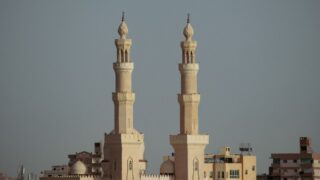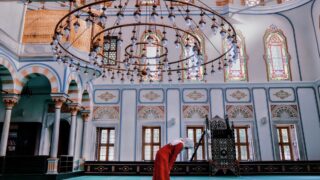They were sparkling gems in their own times, and they continue to glisten beyond their age with everlasting appeal. Each of these women was a legend in her own right. They were all declared the best of women by the Last Prophet (peace and blessings be upon him). What were the special characteristics these illustrious women had and how can we follow in their footsteps?
What are the most famous women of today celebrated for? The women we see being held up as role models for modern woman include actresses, singers, footballers WAGs (wives and girlfriends) and glamorous models. They are all celebrated for their physical appeal. It is rare that a woman is considered ‘successful’ for other than what is superficial and then when she ages and her physical beauty fades, she will fall out of favor with the media and younger women will replace her as the icons of their era.
However, Almighty Allah shows us in His book that a woman is so much more than just the outer shell that is her body. Our history is replete with examples of great women who were gems of their times and whose sparkling appeal remains timeless. Islam tells us that the people who are truly successful are those who have integrity, who fulfill the purpose of their creation and rise to the challenges that are presented to them throughout life with firmness, thereby gaining the pleasure of their Creator and everlasting success in the next life.
Prophet Muhammad (peace and blessings be upon him) said in an authentic hadith:
The best women of the women of Paradise are Khadijah bint Khuwaylid, Fatimah bint Muhammad, Maryam bint `Imran, and Asiyah bint Muzahim (the wife of the Pharaoh).” (Ahmad)
Almighty Allah specifically mentions two of these great women in the Qur’an as role models for believing men and women. In Surat At-Tahrim Almighty Allah says:
(And Allah has set forth an example for those who believe: The wife of Pharaoh, when she said: “My Lord! Build for me a home with you in Paradise, and save me from the Pharaoh and his actions, and save me from the people who are oppressors.
And Maryam, the daughter of Imran who guarded her chastity. And we breathed into the sleeve of her garment through our Ruh, and she testified to the truth of the words of her Lord and believed in His books and was of those who are obedient to Allah) (At-Tahrim 66:11-12)
What were the characteristics that made them worthy of this acknowledgement? What made Almighty Allah and His Messenger single out these women above all others? And more importantly, how can we benefit and learn from their examples?
They Immediately Affirmed the Truth
The four greatest women immediately submitted to the truth and to the commands of Almighty Allah, without any hesitation. We see from their stories that Maryam accepted the huge task that Almighty Allah had given her. She underwent pregnancy and childbirth by herself, unsupported by a man and then she presented her child to the people who would inevitably accuse her of being unchaste.
Khadijah accepted Islam immediately and was the first Muslim. When the Prophet (peace and blessings be upon him) returned from Mount Noor having received the first revelation from Angel Jibreel, it was Khadijah who immediately accepted his message and believed in him even though he himself was shaken by the event.
Lesson I: Today, there is a culture amongst us of ‘ fatwa shopping’. In other words, when an Islamic ruling makes us feel uncomfortable, instead of saying ‘we hear and we obey’, we just go and ask someone who has another opinion until we find the opinion that coincides with our desires. We must become women who, when faced with the truth in any matter, sincerely accept it and submit without hesitation.
Their Strong Relationship With Almighty Allah
Their knowledge of Almighty Allah and His attributes brought them close to Him. When the Prophet (peace and blessings be upon him) returned from the Cave of Hira, fearing something bad had happened to him, Khadijah knew that Almighty Allah would never forsake him. She said: “Allah would never humiliate you, for you are good to your relatives, you are true to your word, you help those who are in need, you support the weak, you feed the guest and you answer the call of those who are in distress.” She knew that Almighty Allah is just and does not humiliate the righteous.
Asiyah knew, when Pharaoh was torturing her to turn her away from her faith, that Almighty Allah could hear her cries and her du`aa’. She asked Almighty Allah to build for her, with Him a house in Paradise. Throughout her ordeal, Almighty Allah showed her the house in Paradise, which made her smile, just as she was being martyred at the hands of her husband.
Maryam had such a close relationship with her Lord that he would provide her with the fruits of summer in winter and the fruits of winter in summer. When Prophet Zakariyyah (peace be on him) saw this he asked her from where she got the food. She answered, [This is from Allah. Verily, Allah provides sustenance to whomsoever He wills without limit.] (Aal `Imran 3:737)
Lesson II: If we are to draw close to Almighty Allah we too must have correct knowledge of Him and His names and attributes and mention Him often through dhikr. If we remember Him much in times of ease, only then we will be able to remember Him in times of difficulty.
They Submitted to Allah
Almighty Allah describes the true believing women as being obedient and He described Maryam in particular as having the characteristic of obedience. Almighty Allah says in Surat Aal `Imran, verse 43:
[O Maryam! Submit yourself with obedience (Uqnuti) to your Lord and prostrate yourself, and bow down along with those who bow down.] (Aal `Imran 3:43)
This means to stand for long periods of time in prayer and this was a particular characteristic of Maryam and Fatima. It also means to be devoutly obedient and to submit to Almighty Allah.
Lesson III: We must become true worshippers of Almighty Allah, not only striving to establish our prayers, but striving to concentrate and to lengthen our prayers, in particular, the Night Prayer (Tahajjud). We must have soft hearts that accept Allah’s commands and obey Him with devotion.
They Supported the Believing Men in Their Lives
Asiyah saved baby Musa from Pharoah, brought him up and believed in him. Maryam was pivotal to the message of `Isa and she brought him to the people as a sign from Almighty Allah. Fatima defended her father when the idolaters in Makkah threw the blood and intestines of a dead camel on her father’s back while he was praying. She removed the filth and stood up to the men who had attacked her father, only to be slapped in the face by Abu Jahl.
Khadijah stood by the Prophet (peace and blessings be upon him) and spent her wealth for the sake of his message. She endured the difficult period of the boycott when the Muslims and their supporters were forced to dwell in a valley away from the people of Makkah and were refused food or trade. The Muslims used to eat leaves due to their extreme state of poverty. Khadijah endured these hardships and stood by the Prophet (peace and blessings be upon him).
Lesson IV: We must support our men folk and help them to be ‘real men’. We must stand by them in times of difficulty and strengthen them when they feel weak in their faith. A woman can have an amazing effect on a man’s self-esteem and confidence. In sha’ Allah, we will be rewarded for helping our men to be better servants of Almighty Allah.
They Had Courage
Fatima was often seen in the wars that the Muslims fought. She used to treat the wounded and she stood up to Abu Jahl when he attacked the Prophet (peace and blessings be upon him). Maryam had the courage to bring `Isa to her people after her difficult ordeal. She knew they would accuse her of being unchaste, yet she bravely obeyed Allah’s command. Khadijah had the courage to follow and encourage the Prophet (peace and blessings be upon him) in his mission even though she endured hardship because of it. Asiyah courageously stood up to Pharoah, the greatest tyrant of that time and refused to become a disbeliever.
Lesson V: We have to be prepared to do difficult things in our lives. We must have the courage to speak out to defend the oppressed and to tell people about Islam without compromising it and we must be prepared to sacrifice anything for the sake of the truth.
They had Istiqamah and Sabr
Istiqamah means to stand firm upon the straight path and sabr is patient perseverance. In other words, they tenaciously held on to the truth regardless of what might happen.
Asiyah remained firm on the faith of Musa throughout her torture and martyrdom. Maryam remained patient when facing her peoples’ accusations and throughout the tests she faced. Khadijah and Fatima endured the three-year boycott that was imposed on them and patiently bore the persecution of Makkah and retained their faith.
Lesson VI: We live in a time when we need Istiqamah. We need to stay true to the message of Prophet Muhammad (peace and blessings be upon him) and not be tempted to compromise our faith to appease other people. This means we will have to be patient and sometimes people will be displeased with us, but ultimately we will have pleased Almighty Allah and He will grant us success.
They Had Tawakkul (Reliance Upon Allah)
When she was being persecuted for worshipping Almighty Allah, Asiyah’s reliance on Almighty Allah made her stay firm on her faith and not yield under the intense pressure. Fatima faced poverty and physical hardship after her marriage to `Ali to the point that her hands became rough and her face changed color due to the physically demanding work she had to do. Despite this she was not allowed to receive zakah and was not granted a servant when she wanted one. Instead the Prophet (peace and blessings be upon him) taught her and `Ali to say ‘ subhan Allah’ 33 times and al-hamdu lillah 33 times and ‘ Allahu Akbar’ 34 times. He reminded them that Almighty Allah was the One who would make things easier for them so they should put all their trust in Him. All four women were able to persevere through the tests they faced due to their reliance upon Almighty Allah and the knowledge that He would rectify their affairs.
Lesson VII: We must learn to truly put our trust in Almighty Allah and trust that after we have done our part, He will make everything turn out right as long as we are conscious of Him.
They Were not Attached to the Worldly Life
The Prophet (peace and blessings be upon him) once told Fatima to remove the gold bangles she was wearing as he wanted to teach her not to desire this life. She immediately removed the bangles and gave them away in charity. Khadijah spent her wealth in supporting the da`wah during the Makkan period. She gave up her status as one of the most noble and esteemed women of the Quraish in order to stand by the Prophet (peace and blessings be upon him).
Asiyah could have had a life of luxury as she was married to the richest and most powerful man in the world. However, she gave up the material delights she could have enjoyed if she had complied with Pharaoh’s wishes. She chose what was with Allah over this worldly life.
By Fatima Barakatullah


















